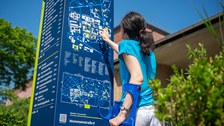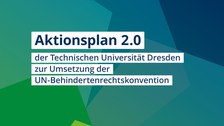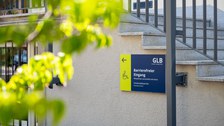Action Plan 2.0 of the TU Dresden on the implementation of the UN CRPD
Inclusion at TU Dresden means recognizing and valuing the diversity of all students and employees - fair, non-discriminatory and self-determined participation for all.
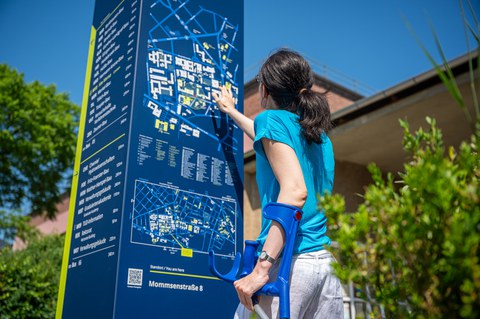
© Crispin-Iven Mokry

© panthermedia.net / belchonock

© Crispin-Iven Mokry

© Crispin-Iven Mokry
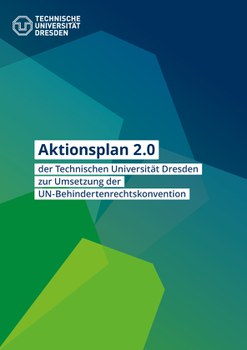
© TU Dresden
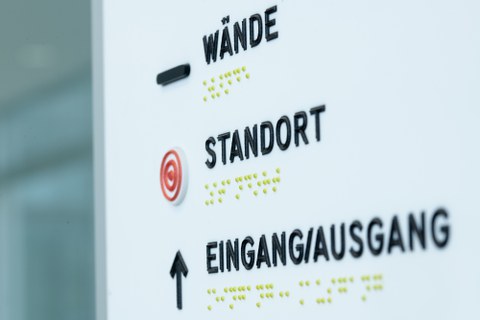
© Michael Kretzschmar
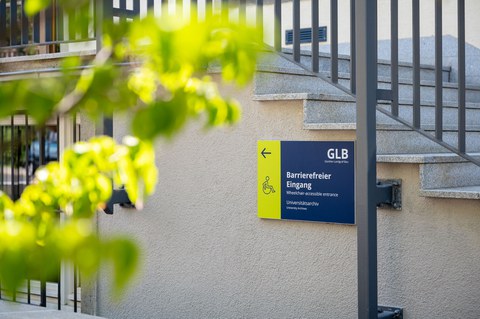
© Crispin-Iven Mokry

© PantherMedia / Andriy Popov

© Crispin-Iven Mokry
A university-wide strategic action plan for the inclusion of people with disabilities and chronic illnesses is a necessary instrument for promoting and expanding this development in the long term.
- Existing offers are recorded, reviewed and adapted if necessary,
- identify(further) needs for action,
- future university-wide goals are formulated,
- and suitable measures are derived.
In November 2022 the Action Plan 2.0 of the TU Dresden on the implementation of the Convention on the Rights of Persons with Disabilities was resolved by the Rectorate.
The development of Action Plan 2.0
TU Dresden was the first university in Saxony to publish its first action plan in 2017. In its analysis of ten years of the UN Convention on the Rights of Persons with Disabilities, the German Institute for Human Rights particularly emphasized the highly binding nature of this action plan and the high level of participation of various stakeholders at TU Dresden in its development, describing it as exemplary.(German Institute for Human Rights, 2019, p. 35/36).
The implementation and realization of the goals set and the measures derived from them are a long-term task for the university as a whole. The action plan therefore requires constant updating and review of target achievement. This approach has also been implemented and further developed in this update of the new action plan.
TU Dresden's Action Plan 2.0 for the implementation of the UN CRPD shows not only the offers in the field of inclusion based on the 6 areas of activity, but also previous good practice in these areas and the central objective in each area of activity:
- Areas of activity: structural and digital accessibility
Key objective: Structural and digital barriers were identified and gradually removed. The creation of new barriers has been prevented as far as possible. - Areas of activity: Employment
Key objective: TU Dresden has increased the number of employees with disabilities and chronic illnesses and further promoted the participation of people with disabilities. - Areas of activity: Quality management
Key objective: Instruments for the quality assurance of inclusive learning and working conditions at TU Dresden have been implemented in a holistic quality management system and are being continuously developed. - Areas of activity: Teaching and research
Key objective: TU Dresden has increased the visibility of the topic of inclusion within research projects in a targeted manner. At the same time, the topic has been incorporated more strongly into research, thereby promoting interdisciplinarity and awareness. Scientists with disabilities and chronic illnesses in the qualification phase or in the postdoc phase are supported in a targeted manner. - Areas of activity: Studies
Central objective: TU Dresden ensures low-threshold access and transition to the study, graduate and employment phases. For people with disabilities and chronic illnesses, the course of study and graduation has been made easier and the number of successful degrees has been increased. - Areas of activity: Awareness and communication
Key objective: TU Dresden ensures equal opportunities for all by removing barriers in communication structures and raising awareness of the issue of inclusion. Furthermore, it fulfills the obligation of public institutions to provide information clearly and comprehensibly. This information is easily accessible for people with cognitive impairments or people whose first language is not German.
You are welcome to order print copies of the Diversity Strategy 2030, the Equal Opportunity Concept and TU Dresden's plan of action for implementing the UN Convention on the Rights of Persons with Disabilities. Please write to diversity.management@tu-dresden.de with the name and number of the documents you would like to receive.

